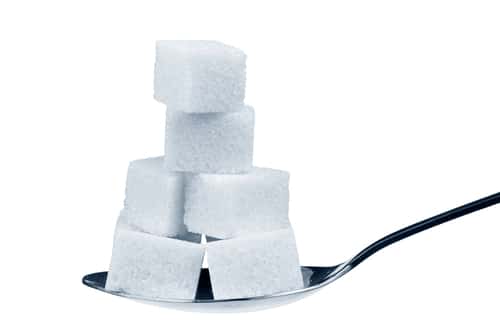
How High Fructose Corn Syrup and Sugar Differ
Despite the name, high fructose corn syrup has only slightly higher levels of fructose than simple table sugar. Table sugar is made up of roughly equal amounts of fructose and glucose, while high fructose corn syrup is about 55% fructose to 42% glucose and other sweeteners. Even though their fructose to glucose ratio is similar, they come from different sources. Table sugar comes from sugarcane and sugar beets whereas high-fructose corn syrup is made from corn starch. To make high-fructose corn syrup, corn starch is processed to produce corn syrup, primarily made up of glucose. Then enzymes are used to convert some of the glucose in corn syrup to fructose to make the final product – high-fructose corn syrup.
Why the Appeal?
Food and beverage manufacturers have eagerly embraced high-fructose corn syrup because it’s a cheaper alternative to cane sugar. Plus, it’s sweeter than table sugar and honey so they don’t have to add as much to sweeten products. Soft drink manufacturers are particularly fond of it, but if you read the ingredient lists, you’ll see high-fructose corn syrup as an ingredient in many packaged products in the grocery store. Most people consume far more of this controversial sweetener than they realize.
Is High-Fructose Corn Syrup Worse Than Sugar?
This is a hotly debated topic. Your body metabolizes fructose and glucose, the sugar structures that make up both high fructose corn syrup and cane sugar, differently. Glucose requires the release of insulin to be taken up by cells whereas fructose does not. Fructose travels directly to the liver where it’s converted to triglycerides.
Researchers at Princeton University found that rats that drank water sweetened with high fructose corn syrup gained more weight and developed higher triglyceride levels than rats that drank water sweetened with table sugar. They also developed more visceral fat, a type of deep abdominal fat linked with type 2-diabetes and heart disease.
If high-fructose corn syrup and table sugar have roughly equal amounts of fructose and glucose, why is high-fructose corn syrup more likely to raise triglyceride levels and increase belly fat, at least in rats? One explanation may lie with the chemical structure of glucose and fructose in each type of sweetener.
In table sugar, glucose and fructose are bound together by a bond that has to be broken down by enzymes to free the glucose and fructose. In high-fructose corn syrup, fructose is unbound and doesn’t have to undergo enzymatic breakdown. It can enter the bloodstream and go directly to the liver to be converted to triglycerides. The question is whether high-fructose corn syrup has a similar effect in humans.
Another problem with fructose is it appears to lower leptin levels, leading to poor appetite control. One way it may do this is by keeping leptin from entering the brain where it could successfully induce satiety. So fructose may prevent the appetite-suppressing effect of leptin, making it easier to overeat.
Is High Fructose Corn Syrup Unfairly Demonized?
It’s still unclear whether high fructose corn syrup is “worse” than table sugar. What we do know is that too much sugar of any type isn’t healthy. Neither table sugar nor high-fructose corn syrup has nutritional value – but both have calories. So when you consume either you’re getting “empty calories.” In addition, both table sugar and high-fructose corn syrup contain fructose, so if fructose raises triglyceride levels, so should sugar. The best solution? Cut back on all sugars – including table sugar.
References:
Princeton University News. “A sweet problem: Princeton researchers find that high-fructose corn syrup” prompts considerably more weight gain”
J Clin Endocrinol Metab. 2004 Jun;89(6):2963-72.
AJP Regulatory Integrative and Comparative Physiology, October 2008; DOI: 10.1152/ajpregu.00195.2008.
Related Articles By Cathe,
Another Look at Fructose: Does It Cause You to Overeat?
Should You Be Concerned about the Sugar in Fruit?
Are Natural Sweeteners Really Better for You?
Ingredient in Processed Foods Linked with Weight Gain and Metabolic Syndrome

